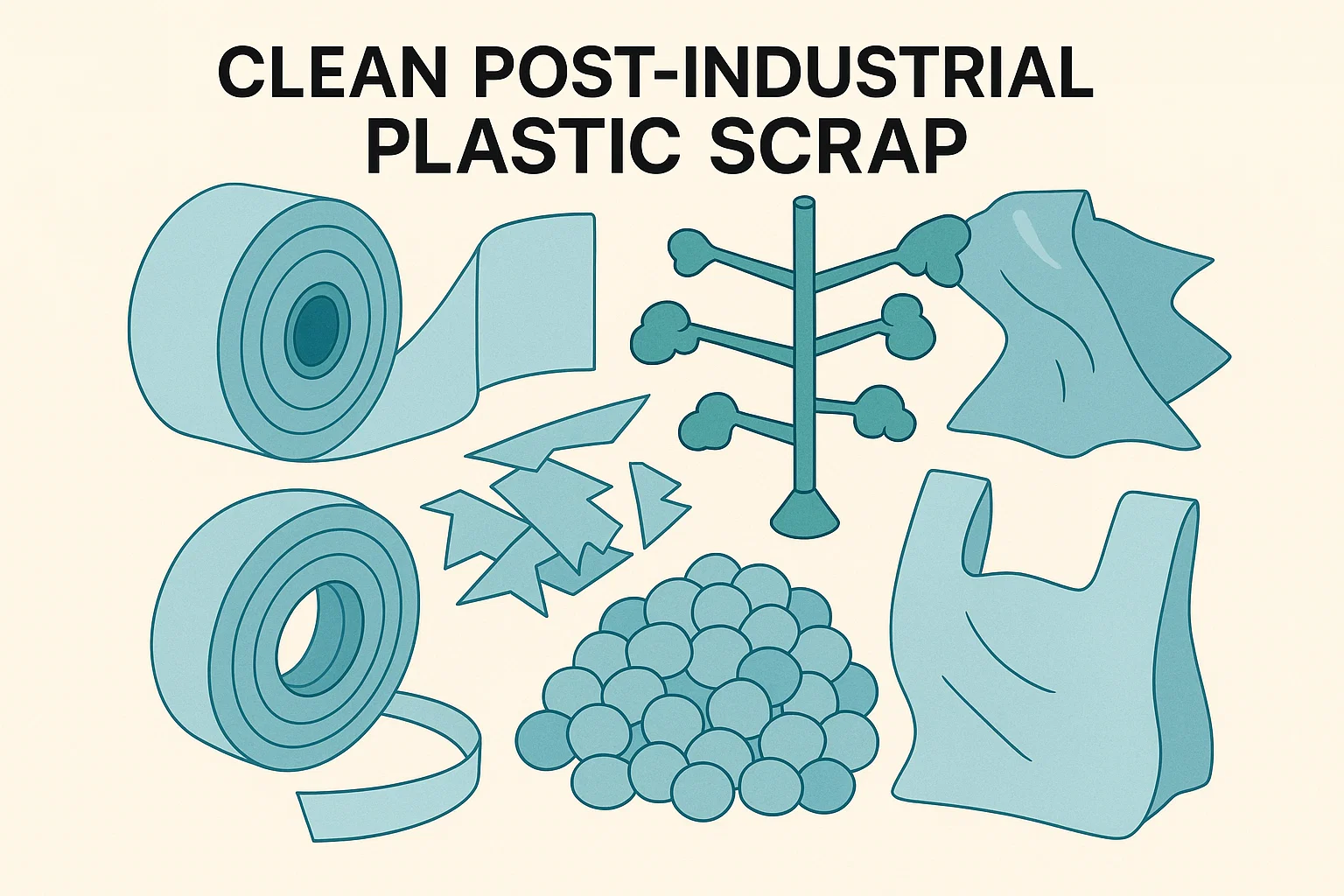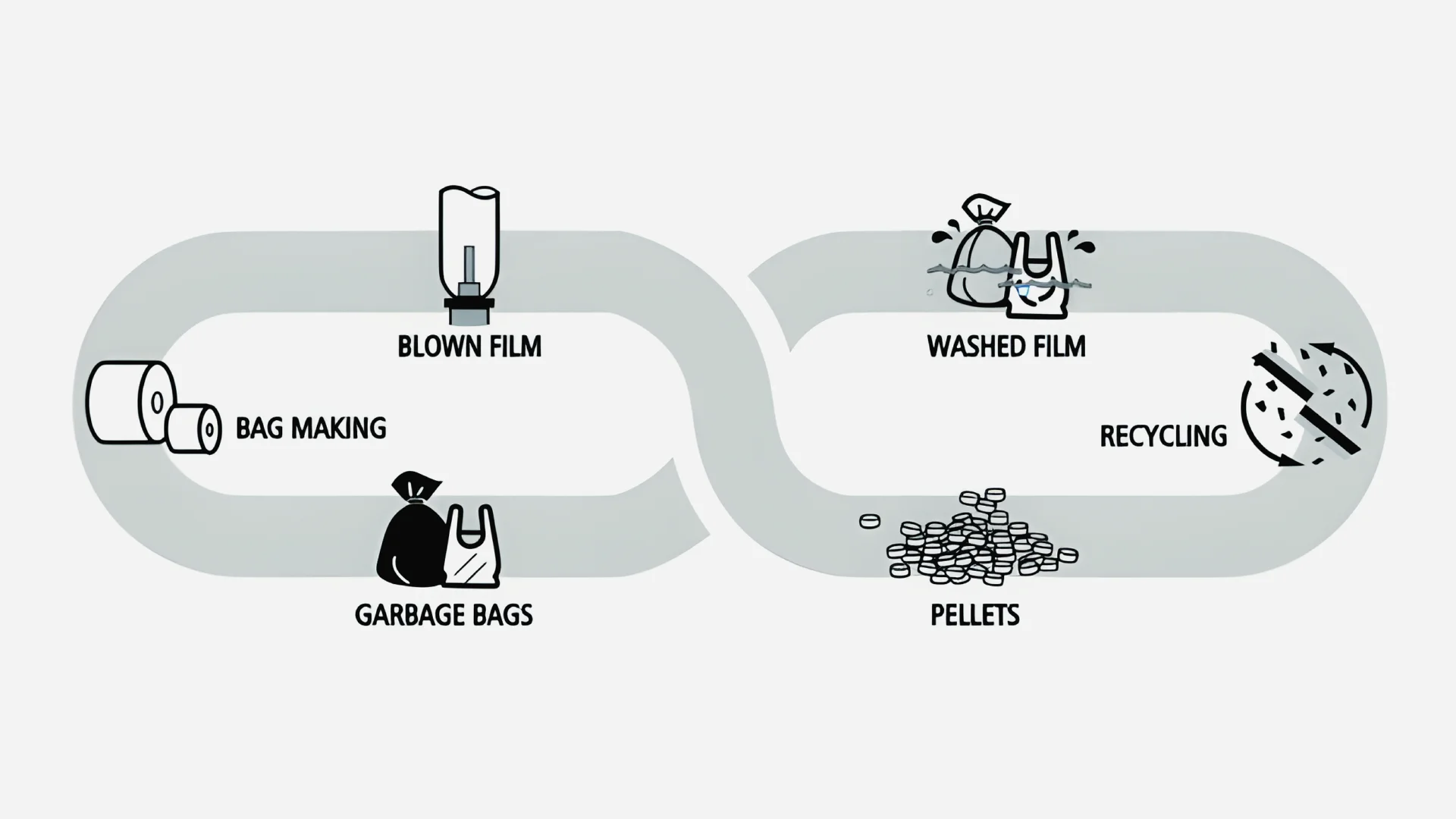Een Gids voor Fabrikanten over In-Huis Plastic Recyclingsystemen
An in-house plastic recyclingmachine is a strategic asset that transforms your production waste from a liability into a valuable resource. For plastic manufacturers dealing with volatile raw material prices and increasing environmental regulations, processing post-industrial scrap on-site is no longer a niche practice but a core component of efficient and profitable operation. This guide explains the financial, operational, and market advantages of integrating a recycling system directly into your workflow.
Het negeren van productieafval betekent het weggooien van waardevolle polymeren en betalen voor hun afvoer. Door in-house te recyclen, hebt u directe controle over uw materiaalketen, verlaagt u operationele kosten en verbetert u de kwaliteit van uw producten. Laten we ontdekken hoe dit proces werkt en de tastbare voordelen die het biedt.
Understanding Post-Industrial Recycling (PIR)
Post-industrial recycling, or PIR, is the process of reclaiming plastic scrap generated during manufacturing before it ever leaves the facility. This is distinct from post-consumer recycling (PCR), which deals with products that have been used by consumers and discarded. PIR materials are cleaner, more uniform, and have a known composition, making them ideal for high-quality recycling.
Common Types of Recyclable In-House Plastics
Nearly every plastic manufacturing process generates recyclable scrap. With the right plastic recyclingmachine, you can efficiently reprocess these materials back into high-grade pellets. Examples include:
- Film and Sheet Extrusion: Edge trims, roll scraps, and non-conforming startup materials from HDPE, LDPE, LLDPE, PP, and BOPP production.
- Injection Molding: Sprues, runners, rejected parts, and purge materials from PP, HDPE, ABS, and PS processes.
- Blow Molding: Flash, tails, and defective containers from HDPE and PP bottle manufacturing.
- Bag Conversion: Punch-outs from T-shirt bags, handle scraps, and misprinted bag material.
- Woven Products: Off-cuts from PP woven bags and non-woven fabric production.
Omdat u volledige kennis heeft van de oorsprong, toevoegingen en eigenschappen van het materiaal, zijn de ontstane gerecycleerde korrels zeer consistent en kunnen ze met vertrouwen worden opnieuw worden ingezet in uw primaire productielijnen.

The Financial Case for an On-Site Plastic Recycling Machine
Investing in an in-house plastic recyclingmachine delivers clear and measurable financial returns. It directly addresses several major cost centers in manufacturing while opening up new opportunities for revenue.
1. Drastically Reduce Raw Material Expenditures
Het meest significante financiële voordeel is de verminderde afhankelijkheid van ruwe polymeren. De prijs van plasticresina is onderhevig aan marktvolatiliteit die is verbonden met wereldwijde olieprijzen en ketenonderbrekingen. Elke kilogram afval dat u in-house recyclet, is een kilogram ruw materiaal dat u niet hoeft te kopen. Deze directe vervanging verlaagt uw productiekosten en beschermt uw bedrijf tegen prijsdalingen. Bijvoorbeeld, het herverwerken van uw PP-afval kan de aankoop van primaire PP-resina compenseren, wat leidt tot aanzienlijke besparingen over een fiscaal jaar.
2. Eliminate Waste Disposal and Third-Party Recycling Costs
Outsourcing your plastic waste management involves multiple expenses. These include:
- Transportation Fees: The cost of shipping scrap to a third-party recycler.
- Service Charges: Fees paid to the recycling company for processing your material.
- Storage Costs: The expense of allocating warehouse space to accumulate enough scrap for a full truckload.
- Disposal Fees: Costs associated with sending non-recyclable or contaminated waste to a landfill.
An in-house system removes these recurring expenses from your budget. The process becomes streamlined: scrap is collected from the production floor and processed immediately, saving time, space, and money.
3. Generate a New Revenue Stream
If your facility generates more scrap than you can re-use in your own products, you can sell the high-quality recycled pellets on the open market. There is strong demand for consistent, clean post-industrial resin. According to reports from industry analysts, the market for recycled plastics is growing, driven by corporate sustainability goals and government mandates. By selling your surplus pellets, you can turn what was once a waste product into a profitable secondary business line.
Gain Full Control Over Material Quality and Consistency
When you send scrap to an external recycler, you lose control. The returned pellets may be a blend of materials from various sources, leading to inconsistencies in melt flow index (MFI), color, and mechanical properties. This variability can compromise your final product quality.
Unmatched Material Purity and Predictability
Recycling your own scrap in-house ensures you know exactly what is going into your production line. You control the entire process, from scrap collection to pelletizing. This guarantees that the recycled material is 100% compatible with your virgin resin, maintaining the strict quality standards your customers expect. For applications requiring precise specifications, such as technical films or precision-molded parts, this level of control is essential.
Create a Closed-Loop Production System
An in-house plastic recyclingmachine facilitates a true closed-loop system. Defective products or production scrap can be immediately reprocessed and fed back into the same production run. This rapid feedback loop improves overall material efficiency and minimizes waste. It transforms your manufacturing facility into a more self-sufficient and resourceful operation, a key principle of the circular economy.
Meet Regulatory Requirements and Enhance Your Brand Image
Globally, governments and consumers are demanding greater environmental responsibility from manufacturers. Integrating in-house recycling is a powerful way to meet these expectations and build a stronger, more sustainable brand.
Comply with Recycled Content Mandates
Vele regio's, waaronder de Europese Unie en staten zoals Californië, hebben wettelijke voorschriften aangenomen die eisen dat producten een minimum percentage aan gerecycleerd materiaal bevatten. Bijvoorbeeld, de EU's Richtlijn voor Einmalig Gebruikte Plastics stelt doelen voor gerecycleerde inhoud in drankflessen. Het hebben van uw eigen bron van hoge kwaliteit post-industriële gerecycleerde korrels maakt het eenvoudiger en kosteneffectiever om deze wettelijke verplichtingen te voldoen en toegang te krijgen tot milieubewuste markten.
Strengthen Your Environmental, Social, and Governance (ESG) Profile
Een toewijding aan recyclen versterkt de ESG-gegevens van uw bedrijf, wat steeds belangrijker wordt voor investeerders, partners en zakelijke klanten. Het aantonen van een tastbare vermindering van afval en consumptie van ruwe materialen versterkt uw reputatie als verantwoord producent. Dit kan een concurrentievoordeel bieden in een markt waar duurzaamheid een cruciale aankoopcriteria is.
Choosing the Right Plastic Recycling Machine for Your Needs
Selecting the appropriate machine is critical for success. The ideal system depends on your specific materials, volume, and operational goals. At Energycle Machine, we provide a range of solutions tailored to different manufacturing environments.
Key Considerations for Machine Selection:
- Materiaalsoort: Is uw afval voornamelijk zacht film (LDPE, HDPE) of harde plastic (injetgevormd PP, PS)? De snijder, de schroefontwerp en het voedingsmechanisme van de machine moeten overeenkomen met het materiaal.
- Besmettingsniveau: Post-industrial scrap is usually clean, but printed films or slightly dusty materials may require systems with better degassing and filtration.
- Vereiste doorvoer: De capaciteit (kg/uur) van de machine moet aansluiten bij het volume van afval dat uw faciliteit genereert om een efficiënte werfvoering te waarborgen.
- Footprint and Integration: Consider the available space in your facility and how the machine will fit into your existing production layout.
Our team at Energycle-machine can help you assess your needs and recommend the perfect plastic recyclingmachine to maximize your return on investment. We offer systems designed for simplicity, reliability, and producing the highest quality pellets.
Veelgestelde vragen (FAQ)
What is the typical ROI on a plastic recycling machine?
The return on investment (ROI) for a plastic recyclingmachine De terugverdientijd is meestal zeer sterk, vaak binnen 12 tot 24 maanden. De exacte tijdspanne hangt af van het volume van afval dat u verwerkt, de kosten van het ruwe resin dat u compenseert, en de besparingen uit het weggelaten van afvoerkosten. Hoogvolumeproducenten zien vaak een snellere terugverdientijd.
Kan ik afdrukbare of meerdere lagen films recyclen?
Ja, veel moderne recyclingmachines zijn uitgerust met geavanceerde functies om deze materialen te verwerken. Dubbele ventilatie-degassingssystemen helpen inkt en vocht te verwijderen, terwijl hoge prestatie schermverversers en filters onzuiverheden kunnen verwijderen, waardoor schone, bruikbare granulaatvormen ontstaan.
Hoeveel arbeid is nodig om een in-house recycling systeem te bedienen?
Moderne recyclingmachines zijn ontworpen voor een hoog mate van automatisering. Een enkele operator kan typisch de bediening van de machine beheren, van het voeren van het afvalmateriaal in de hopper tot het inpakken van de afgevulde granulaatvormen. De gebruiksvriendelijke bediening en automatisering


